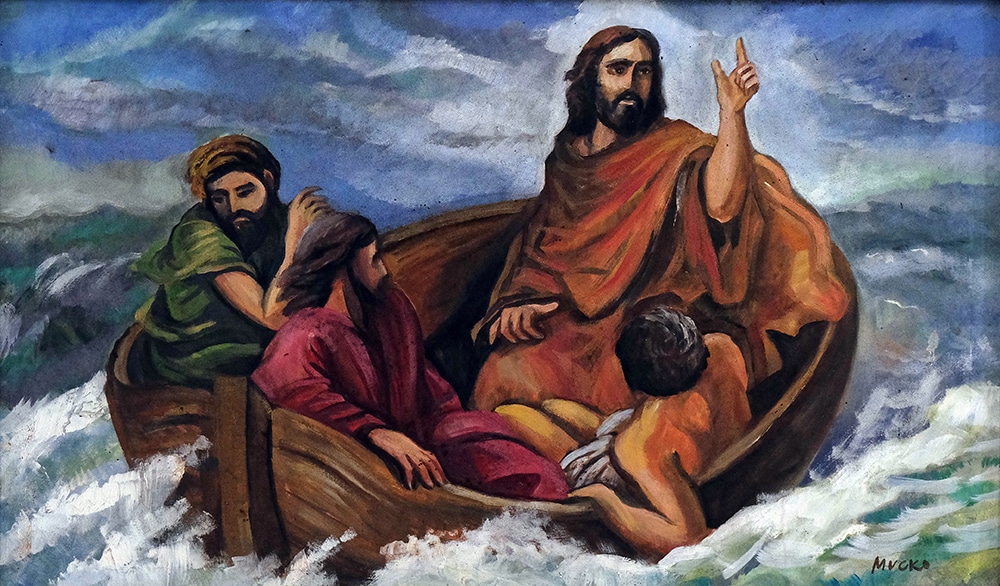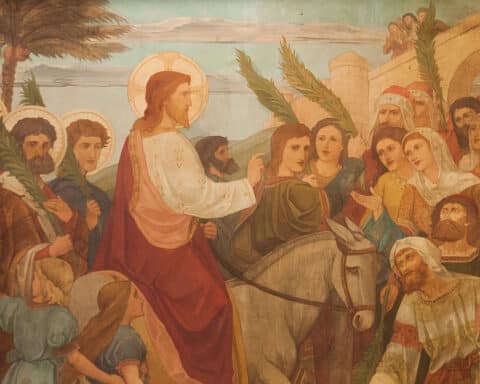
For a Jewish reader of the Bible, the answer is patent. It is the God of Abraham, of Isaac and of Jacob.
The God who separated the chaotic waters at creation.
The God who brought righteous Noah safely through a flood.
The God who led Israel dry-shod through the waters of the Red Sea.
The God who, in speaking to the suffering Job, reminds the desolate man that it is God who set limits for the sea.
| June 20 -Twelfth Sunday in Ordinary Time |
|---|
|
Jb 38:1, 8-11
Ps 107:23-24, 25-26, 28-29, 30-31
2 Cor 5:14-17
Mk 4:35-41
|
Yet, our imagined Jewish reader does not remain only at the literal level. She knows that our present suffering can feel like we are immersed in waters up to our necks. Breathing itself becomes nearly impossible as we suffer from inconsolable waves of sorrow.
In such moments, we feel like we are drowning in the chaotic waters of the primordial flood. And God, that wonderful, all-powerful God who mercifully entered human history, can fish us out.
The Gospel of Mark is a very fine reader of the Hebrew Scriptures.
The disciples are out in a boat. Suddenly, there is absolute chaos. A squall comes. Water is spilling over the sides of the boat.
Jesus is asleep. In the stern of the boat. At the front.
The disciples wake him up. Teacher, we are about to die. Do something. How can you remain passive in this chaos?
Jesus awakes, rebukes the wind, and calms the sea. Then, Jesus asks the disciples why they are terrified. Are you without faith?
Then, the once afraid and now chastened disciples proclaim with wonder, “‘Who then is this whom even wind and sea obey?'” (Mk 4:41).
Mark says nothing more. At least, he says nothing more yet.
But let us return to our imagined Jewish reader. They would recognize more fully than we do the implication of the question asked by the disciples. Jesus is no ordinary bloke. Early in the Gospel, Mark is telling us something about Jesus.
He is the one who stills the roaring seas. Controls the liquid chaos of the oceans.
He is the Lord.
Traditionally, the Church has often been described as a boat. Like Noah, we have been safely led through the chaotic waters of the world. We have passed through the Red Sea in our baptism.
But a boat is not entirely a safe harbor. There is water that spills over the side. The waters of sexual and financial scandals. The waters of apathy. The waters of political wrangling. The waters of clericalism. The waters of racism and sexism. The waters of secularity, of the privatization of religious identity. The waters of Catholic Twitter, of those who hate more than love one another.
The waters of pandemics.
The waters.
Like the disciples, if we are to find our way to a safe harbor, we must cry out to the Lord.
Crying out to the Lord is the beginning of salvation. It is not human effort alone that sustains the Church. It is not planning strategies, consultants receiving thousands of dollars to do SWOT analysis, and reorganizing the chancery around the latest pastoral fad.
We must cry out to Jesus first.
We must pray to Our Lord, relying on the one who can quell the waters of chaos.
After all, so many of the waters described above are self-generated waters of sin and death.
They are the waters that result from placing human actors at the center of the mystery of the Church.
Who can still these waters? Who can control this chaos?
It is Jesus.
The Lord.
Timothy P. O’Malley, Ph.D., is the director of education at the McGrath Institute for Church Life at the University of Notre Dame.





